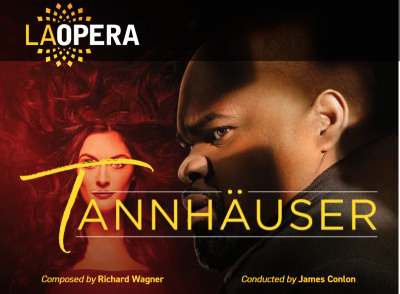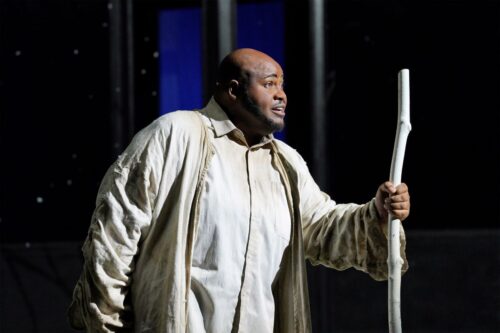IF BEING WRONG IS A VENUSIAN SEX ORGY,
WHO WANTS TO BE RIGHT?
Being Japanese, I am innately programmed to keep clutter to a minimum. Not much adorns my computer desktop screen, save the bare essentials — amongst which is the full score to Tannhäuser, some of the most inventive, majestic music constructed to date, a century-and-change since its 1845, 1861, and 1875 inception. Wagner truly is one of the great seducers of the voice, knowing, down to the very syllable, which vowels can soar above the orchestra with the greatest ease and fluidity — a singer’s wet dream.
Issachah Savage (top) Yulia Matochkina and Issachah Savage (bottom)
And LA Opera’s most recent realization, under the guidance of Conductor James Conlon, did such orchestrations justice. The singing was up to a similar par, with choral direction by Grant Gershon. Proving rather problematic, however, was the weakest link Issachah Savage, whose voice in the title role was simply overpowered in both size and harmonic resonance compared with the rest of the cast, fading into the background for important duets and ensembles that demand a heldentenor to truly dominate. Morris Robinson, in the role of Hermann, did dominate. And rather unfortunately, the charisma of Venus, embodied by Yulia Matochkina for the evening, made a Plain Jane of Sara Jakubiak’s Elisabeth, ultimately compromising Wagner’s message of divine, pure spiritual love triumphing over the erotic (the production failed to make the former more appetizing than the latter).
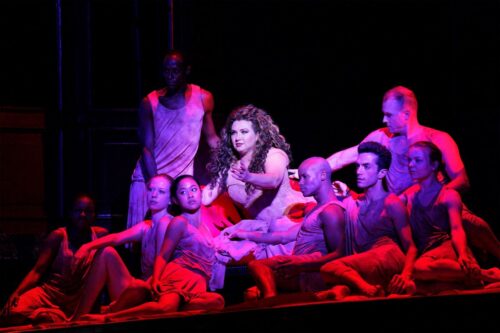
Issachah Savage and Yulia Matochkina with dancers (top) Issachah Savage with dancers (bottom)
Director Louisa Muller’s odd production choices muddled the drama. Models can effectively convey sensuality through gestures; here, there was too much movement. Singers do it with their voice, so the embraces, touches, and kisses came off entirely awkward, as that is not their prime medium. Furthermore, the aesthetic seemed confused from act to act, going from a Skinemax featurette in the Venusberg of Act I, to a monochrome prom reception of indeterminate time period in Act II (over an hour of solely black and white costuming was a bit much), and ending on a Dickensian Christmas vignette in Act III (costumes and set by Gottfried Pilz).
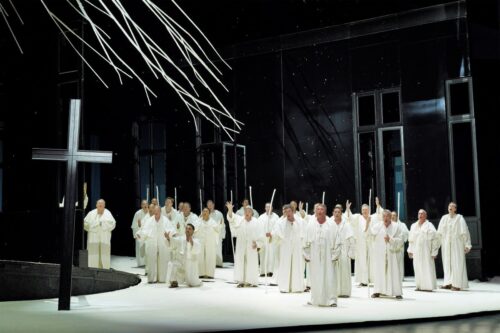
The chorus of pilgrims (top) Issachah Savage (center) with (left to right) Lucas Meachem, Robert Stahley, Anthony Ciaramitaro, Morris Robinson, and Philip Cokorinos (bottom)
The opening modern dance segment, choreographed by Aszure Barton, detracted from the brilliance of the written music, and the suggestion of cunnilingus by any number of the moves would not have been warmly received by the composer, presumably. Furthermore, it compromised the eroticism of Wagner’s work. Eroticism is the sensual delight in what you do not see. Having it explicitly spoon-fed to you is vulgarity. Again, in summation, it failed to make the sale for the victory of the sacred over the carnal. Moreover, it compromised the painfully retentive nature of sex in the German psyche, which is central not only to Wagner’s drama, but his composition style. Such painful sexual retentiveness has only been surpassed by us Japanese.
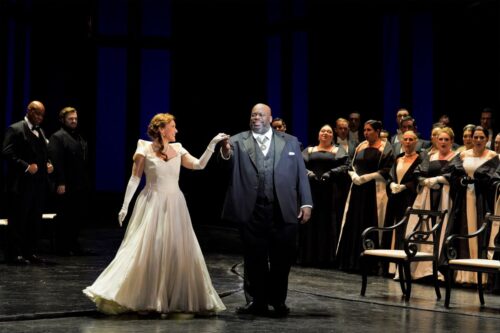
Sara Jakubiak and Morris Robinson Issachah Savage and Philip Cokorinos
photos by Cory Weaver
Tannhäuser
Los Angeles Opera
Dorothy Chandler Pavilion, 135 North Grand Ave.
ends on November 6, 2021
for tickets, call 213.972.8001 or visit LA Opera
